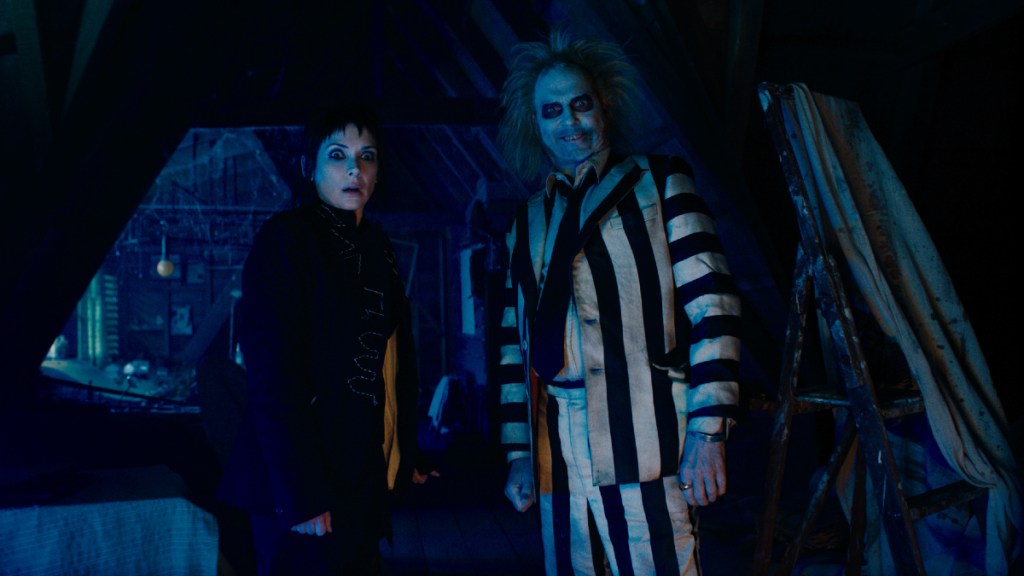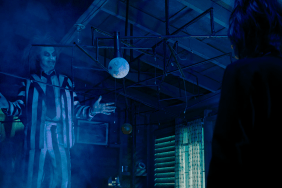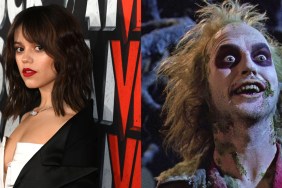It’s not easy being Lydia Deetz (Winona Ryder) as an adult. Finding success early in life due to her ability to talk to ghosts, she’s become a goth icon, somewhat at the expense of her relationship with her daughter Astrid (Jenna Ortega), who thinks it’s all embarrassing BS. Her manager (Justin Theroux) might only be romantically interested in her for her bank account, but she’s boxed into the caricature the media has created around her. Oh, and the psychotic fan who wanted to marry her nearly thirty years ago might be back…from the dead. Along with his equally terrifying ex.
If this sounds more than a little like the situation Tim Burton finds himself in these days, it’s surely not a coincidence. Stereotyped in the eyes of many moviegoers as the goth guy who likes to paint a coat of black and white spirals atop whatever IP Warner Bros. lets him get his hands on, he’s making a welcome return here to one of his very few films that was not based on pre-existing material. Burton has talked about a sequel repeatedly over the years but has said he couldn’t have made this particular version until now. Presumably, that’s because, as a parent, he sees how random people’s wacky mental caricatures of him affect the kids.
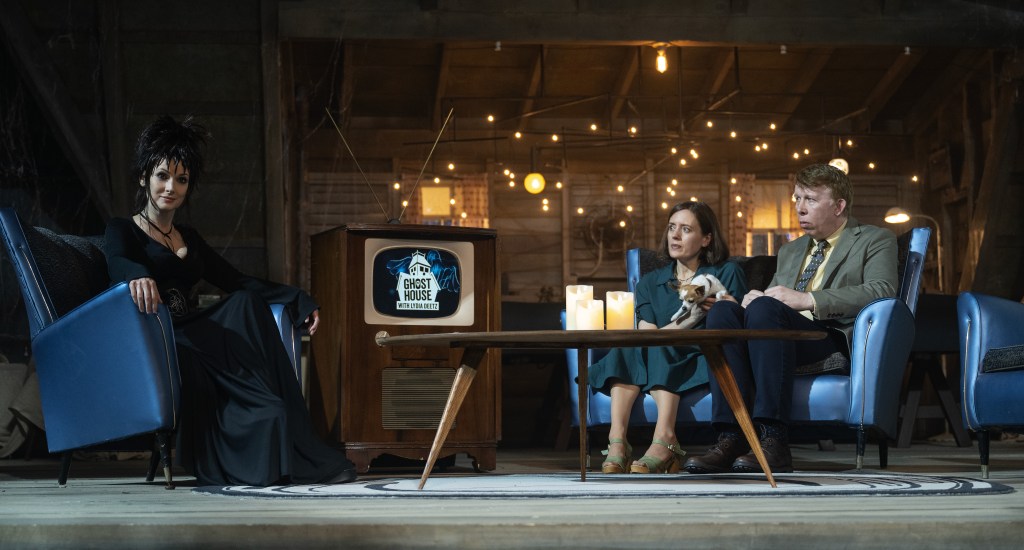
It’s All in the Deetz
Lydia in Beetlejuice Beetlejuice is perhaps Burton’s most personal onscreen avatar since Edward Scissorhands. At the end of the first film, she seemed to have moved out of her morbid goth phase, wearing a more conventional school uniform and treating the local ghosts as pals rather than spooks. Why would she undo that in her life? It’s the same reason Burton keeps going back to the “dark remake.” Well — nobody pays to see his films when they’re Big Eyes. Lydia has a marketable trademark, so of course, she monetizes it, yet the one ghost she never gets to see is her dead husband.
Burton’s heroes tend to be tormented creatives who just want to be normal, while his villains are pure unfettered creative ids who, as Jack Nicholson’s Joker put it, “make art until somebody dies.” In Beetlejuice, in 1986, his human antagonists appeared to be caricatures of Cal Arts classmates; now, they’re phony entertainment industry types, all of whom want to leech on to Lydia. Mother Delia (Catherine O’Hara) is still insufferably pretentious and, indeed, has made art till someone died — her husband Charles, formerly played by Jeffrey Jones, who has suffered a severe case of toxic-actor syndrome died in a plane crash and subsequent shark mauling. Jones’ exclusion is cleverly worked around, and yet his likeness still appears onscreen in photos — doesn’t that mean they still have to pay him?
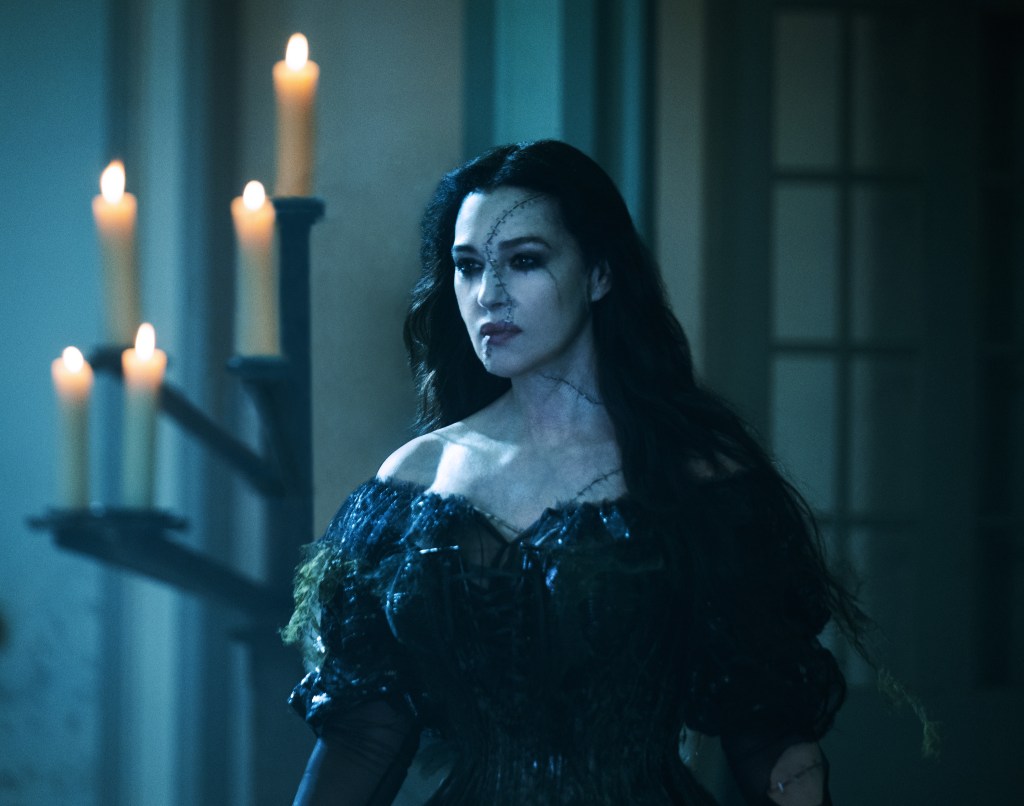
Eternity Rules
Meanwhile, the unadulterated supernatural id that is Betelgeuse (Michael Keaton) is being stalked through the afterlife by his evil ex Delores (Monica Bellucci). When he learns the Deetzes are coming back to the town of Winter River for Charles’ funeral, it means yet another chance at marrying Lydia, which will keep him in the real world for good. It always felt more like a marriage of convenience rather than a pervy older man lusting after a teen, yet it seems here that Betelgeuse has genuinely pined for her over the decades. Mercifully, despite his inherent sleaze, his interactions with Lydia remain chaste.
Many more convolutions ensue, and it’s not always clear what the rules are — as Astrid exclaims, the afterlife can be so random. Yet it also feels a bit like Burton’s take on Hollywood: full of creative and colorful people, yet hamstrung by mind-numbing bureaucracy and hurry-up-and-wait situations. To cite one possible continuity break, it doesn’t seem that this movie upholds the rule of every civil servant in the afterlife being a suicide. And the laws that govern the recently deceased tend to come out of nowhere as the plot needs them. If Betelgeuse’s equally random powers can be part of the fun, though, why worry?
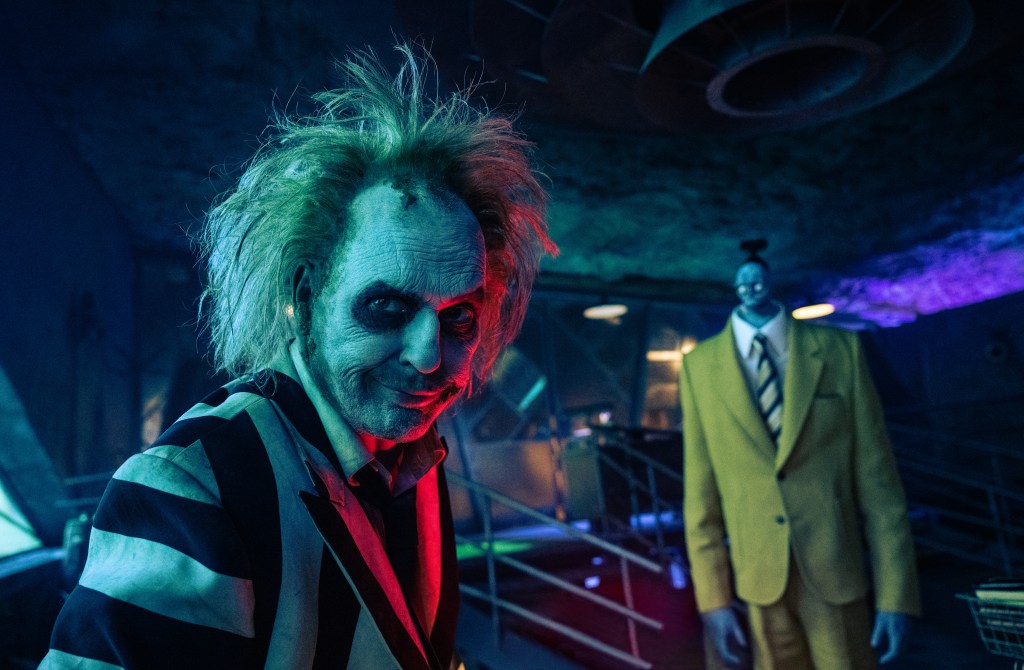
Normal Has Changed
Burton actually takes some creative risks here: it can be extremely dangerous to provide too much backstory on a mysterious character like Betelgeuse, yet the way the director, along with writers Alfred Gough and Miles Millar, handles his origin story is both refreshing and unexpected. If he sometimes plays the hits a bit too much — predictably, nearly every major moment you liked the first time around gets a callback — it nonetheless makes sense. Lydia and Burton have to learn to balance out playing the hits with being true to themselves, and thus the movie must do both.
Alec Baldwin and Geena Davis’ Maitlands have moved on, partly because they’ve aged out of the roles but also because Tim Burton-style weirdness is now familiar enough that we don’t really need grounded, normal people as our guides. Astrid serves that purpose the most as the only character who isn’t especially weird or insane, yet the movie’s perspective is clearly Lydia’s. Surprisingly, Bellucci doesn’t get to do a whole lot, essentially playing a slasher villain who kills ghosts, but Burn Gorman makes a wonderful addition to the cast as the zealous local priest.
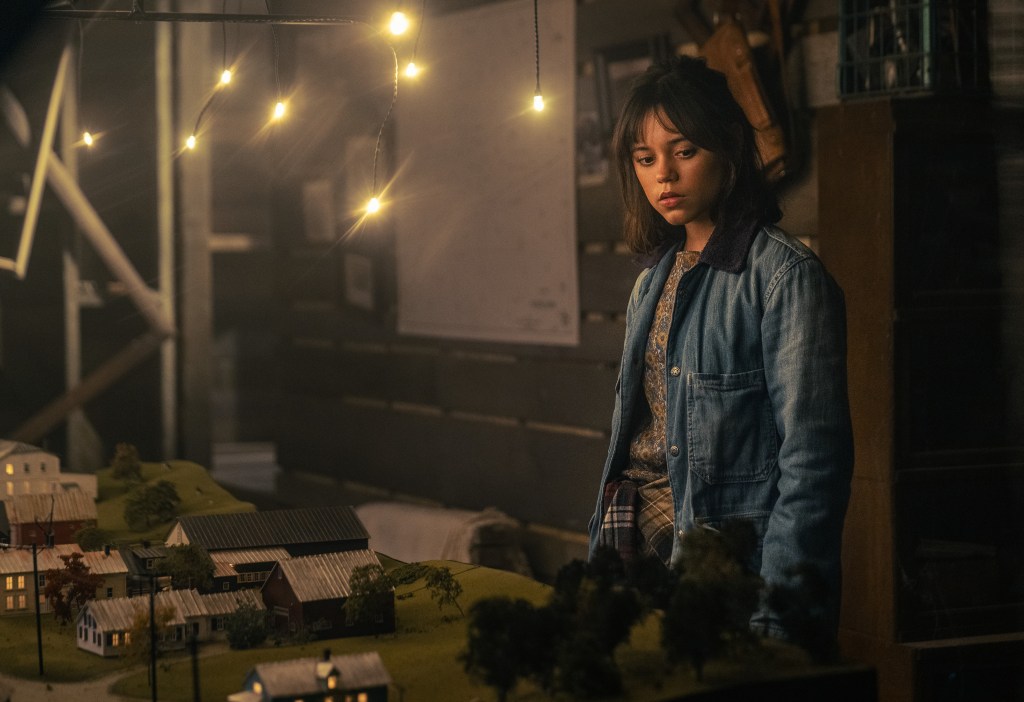
By the Handbook
As an afterlife cop, formerly an actor who insisted on doing his own stunts, Willem Dafoe may or may not be the cinematic year’s second-best diss of Tom Cruise, after The Fall Guy.
The afterlife death gags remain funny, and a baby Betelgeuse seems destined to become a must-have toy for goth couples as soon as NECA or Mezco can crank one out. In lieu of calypso music, the soundtrack now focuses on disco hits and melancholy ’90s alternative. (Let’s just say any movie that uses a song from Scott Weiland’s solo album already has my heart; assess these opinions accordingly.) For those who lovingly remember the TV cartoon, a sequence in the afterlife where Lydia and Betelgeuse actually work together might hit the spot.
For a movie that very easily could have been a cash grab, it’s one that actually has things to say about fame, generation gaps, and toxic relationships of all types. Burton was right to wait until the material meant something new to him, and it feels like it does so for Ryder as well. (Keaton, as in his recent return as Batman, acts and feels timeless, as if nothing has changed.) It’s not remotely as original as, well, the original, because how could it be? But when the scenes that fail to be original are part of the point, it doesn’t need to be.
Grade: 4/5
Beetlejuice Beetlejuice opens September 6 in theaters.
